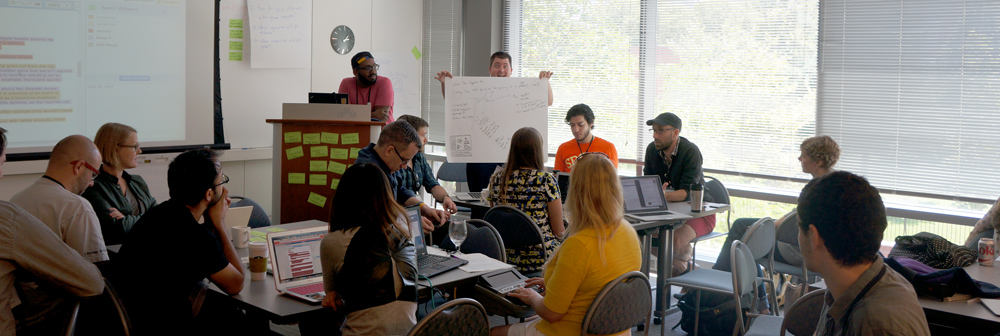How to pitch a SRCCON session
by Erika Owens

Ta-da. You, too, can show off a great SRCCON session idea.
We want to make it as easy as possible for you to pitch your session ideas to SRCCON. We wrote a proposals guide to help answer questions you may have about the process. Today, we present a walkthrough of the proposal form itself. Maybe there’s a certain question you’ve been curious about how to approach or you just want all possible information before submitting your proposal. We’ve got you covered. Let’s dive in.
About your session
As you may have already concluded, this is a pretty important section of the proposal.
- Session title - think, persuasion. The session title is your first impression. It’s a chance to intrigue, invite, alarm. Your session title doesn’t have to be funny or provocative; it’s always a fine choice to default to descriptive. This title will show up on the proposed sessions page and on the eventual SRCCON schedule. If you’re nervous about your title writing skills (I personally hate writing them), you have plenty of other chances to wow us with your idea, which brings us to…
- Session description - tell us what you want to tackle. What’s the question you want to wrestle with or technology you want to work with? Descriptions are typically a few lines long: what you want to cover, how you want to approach it, what you hope people will learn. This is a chance for your excitement to really shine through. Why are you interested in this session? Why do you want to facilitate a session on it?
- What do you hope people will walk away from your session with? - start with your takeaways. This question is not publicly shared. This question is here to get you really thinking about outcomes, something we take seriously at SRCCON. Pro tip: Once you’ve thought this through a bit, it’s a great idea to include a nod to outcomes in your answer to the previous “session description” question—that way potential attendees get a glimpse of your thinking, too. In your answer to this question, tell us about your full thoughts about what attendees will get out of this session.
- What’s a 1-3 word description for the topic this session covers? - this is to help us organize sessions on similar topics
- We have 75 minutes reserved for each SRCCON session. If you think your session needs a different amount of time, let us know here: - each session will have 75 minutes on the schedule. This is up from 60 minutes last year due to feedback that folks thought many sessions could use a little more time. If you have an awesome idea that would work best with more or less time, just let us know. We do have some flexibility in the schedule and have seen longer field trips or shorter lunchtime chats be really great.
- If you’d like to hold your session in a language other than English, please let us know here: - SRCCON is held in English, but many attendees speak languages other than English. We haven’t had a session in language other than English before, but if you’d like to try it out, let us know.
- We expect to receive more than one great proposal for some popular topics. If someone else proposes a session similar to this one and we want to accept both, would you be willing to co-lead a combined session with that person? - we receive many more proposals than we have space for in the SRCCON schedule. Merging sessions on similar topics helps us involve more folks as facilitators. If we see an opportunity to merge a session, OpenNews staff coordinates with both parties and is on-hand to help make the collaboration easier.
- Does this session need a co-facilitator? - would you like to plan and run your session with someone else? Unlike a panel presentation, you don’t need to have a whole bunch of people on your session to represent all possible perspectives–the folks in the room will bring that to the conversation. But a co-facilitator may bring a complementary experience or skillset to your session–maybe they love facilitation or have a lot of energy or always ask questions that your brain loves. It’s up to you whether you need, or would just prefer, to have a facilitator. If you would like one, but don’t know who, we can help with that.
About your co-facilitator
If you already have a co-facilitator in mind, you’ll see a few questions about that person. Please give us as much information about your co-facilitator as possible. This will help us reach out to the person (especially if you don’t have an email address handy). After the call for proposals closes, we will reach out to the co-facilitator to gather their personal information.
Also, if you’re thinking about pitching with a co-facilitator who has a few session ideas, that’s great! When we build the schedule, we try to avoid having facilitators work on more than one session each—it keeps people from being overburdened with responsibilities, makes sure session leaders get to fully participate in the conference, and helps us involve a wider array of facilitators at SRCCON. If the same person is co-facilitator on multiple sessions we want to accept, we will suggest a way to include everyone and may suggest a new co-facilitator for one of the sessions.
About you
- Your name - whatever name, or version of your name, you would like listed with your session on the session proposals page.
- Twitter handle - if you have one, we’ll link to it on the proposal page. If you don’t, no worries!
- Organizational affiliation - let us know where you work. We’re interested in making sure that a variety of news organizations are well represented at SRCCON, especially smaller market and non-coastal news organizations.
- Have you attended SRCCON before? - we aim to make SRCCON welcoming for returning participants and new attendees alike. This question helps us ensure that there’s a good mix of SRCCON experience levels.
Demographics
- Do you identify as a: - this question is strictly optional and confidential. We aim to have a mix of SRCCON participants and want to ensure that people of color, women, and members of other underrepresented groups in journalism tech are well represented at SRCCON.
- Group(s) underrepresented in journalism or technology: - if you selected the “Member of a group underrepresented in journalism or technology, details below” option on the previous question, then this question pops up. We know that gender and race are not the only dimensions of identity and this is a place to share any other details you feel comfortable sharing that may be relevant to your experience in this field and at a conference.
Travel support
- Would you like to be considered for a SRCCON scholarship? - this year we folded our travel scholarship application into the session proposal form. If you answer yes to this question, a bunch of scholarship-related questions will appear. This scholarship exists to help people–in particular members of underrepresented groups and staff of smaller/non-coastal newsrooms–afford to attend SRCCON. Your answer to this question will not affect the review of your session proposal. The scholarship review process is separate from the session review process.
- What interests you about participating in this year’s SRCCON? - we’re curious about what makes attending SRCCON now important to you and your career. We have a limited number of scholarships, and your answers to these questions help us figure out how to prioritize applications.
- What do you hope to bring home from SRCCON? - SRCCON is just two days, but participants in the past have taken new ways of working, new tools and skills, and new networks back to their newsrooms. We’re excited to hear about your plan for taking what you learn at SRCCON and sharing it back home and applying it to your work.
- Are you able to receive any travel support from your employer? If so, what support will they provide? - answer this with your best guess of what your employer will be able to provide. This helps us gauge need.
- What travel costs do you expect you will have to pay for yourself? - standard scholarships are $500 plus a free ticket, but sometimes we can make slight adjustments, such as offering a ticket-only scholarship to people from Minneapolis.
- If you receive a scholarship, are you ok with your contact info being shared with other recipients? - in the past, scholarship recipients have requested being connected with other scholarship folks. We don’t publish the list of scholarship recipients, but if you’d like to connect with other scholarship folks, just let us know.
Closing
- Anything else that you’d like to tell us? - anything means anything–can relate to needs for your session, thoughts that didn’t fit into any of the other answers. If you have a question and would like a quick reply, you can always email us.
- Please confirm that you have read the SRCCON code of conduct and agree to follow it. - the entirety of SRCCON is covered by our code of conduct so we want to make sure you know about it and agree to it. Also, as session leaders, we request your help in upholding the values behind this code during your sessions. We’ll have more details about that in facilitator training. We appreciate your support for making SRCCON a thoughtful, welcoming space.
Hit “submit” and your proposal is complete! You’ll get an email confirmation for your session proposal, and we’ll see it in our proposal review queue. The call for proposals closes at 11:59pm on Friday, April 7. If you’re curious about what happens after you submit your session, there’s details in our proposal guide. We’ll notify you about your session proposal (and scholarship application, if applicable) by Wednesday, April 26.
If you have any other questions about the form, feel free to email us or check out the SRCCON questions and answer session on our next Source community call.
The latest from the OpenNews team
Looking back at 2023: We spent this year creating opportunity
How we connected at SRCCON 2023, and what we're carrying into next year
Read all our news in our OpenNews blog

